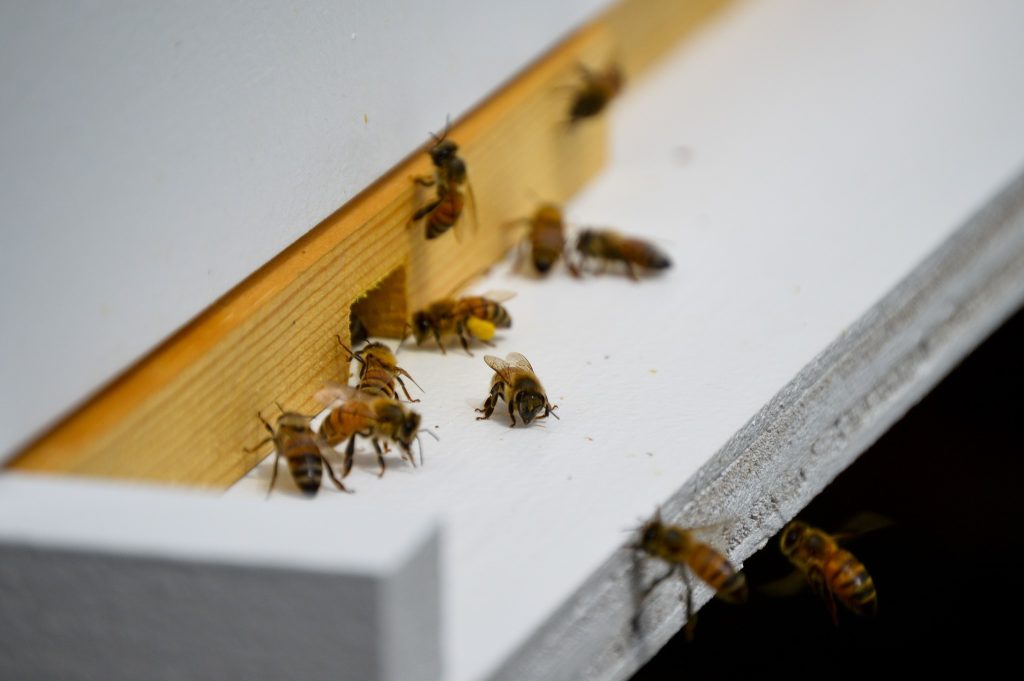Conference hosted 1,130 Master Gardeners and extension professionals from 44 U.S. states, Canada and England.
Penn State Extension Master Gardeners triumphed at the International Master Gardener Conference held June 18-22 in Overland Park, Kansas, earning first place in the research category of the David Gibby Search for Excellence Awards for their exceptional volunteer work and dedication to bee monitoring. The conference hosted 1,130 Master Gardeners and extension professionals from 44 U.S. states, Canada and England.
“It is thrilling to have the honor of joining my Penn State Extension Master Gardeners in receiving this award and for our data collection efforts to be recognized,” said Susan Janton, Master Gardener from Cumberland County.
Named after David Gibby from Washington State University, who created the Extension Master Gardener program in 1972, the award celebrates the efforts and talents of Master Gardener volunteers. These innovative group projects frequently serve as models, influencing the development of extension Master Gardener-led programs worldwide. The awards are divided into categories such as research, demonstration gardens, community service, innovative projects, workshops/presentations, special needs audiences and youth programs.
Earning first place in the research category were 20 Penn State Master Gardeners who partnered with the lab of Margarita López-Uribe, associate professor of entomology in Penn State’s College of Agricultural Sciences, in a multiyear effort to increase understanding of Pennsylvania’s native bee population. This project leverages Master Gardeners’ interest in pollinators while providing advanced training on the protocols used to collect, pin, label and identify native bees.
“I love the fact that we Master Gardeners can contribute to scientific work and provide data for research on pollinators in Pennsylvania at the same time as informing the public about wild bees,” said Stephanie Szakal, Master Gardener from Allegheny County.
López-Uribe noted that bees are the most important pollinators of plants in agricultural and natural ecosystems. “This makes them critical for plant reproduction and the maintenance of most ecosystems across the planet,” she said. “Recent studies have shown evidence of bee decline, but documenting bee decline has been difficult because of the lack of standardized, long-term monitoring data. In Pennsylvania, we don’t really have a good assessment about the status of bee populations. The inspiration to begin with this project was to initiate such an effort.”
Janton said her fascination with native bees began in 2018 upon learning that about 4,000 native bee species exist in North America, including a reported 437 species in Pennsylvania.
“I was astounded by the figures and taken aback by the fact I could identify only two: bumble bees and honey bees,” she said. “I quickly learned bees are not easily identified, their numbers are declining, and the research was somewhat limited to honey and bumble bees.”
The first long-term bee monitoring program in Pennsylvania has had a significant impact on understanding native bee populations across the state, especially in areas where data was not as robust, according to Valerie Sesler, Master Gardener area coordinator for 12 counties in southwestern Pennsylvania.
The program was born from a Science-to-Practice grant from Extension and the College of Agricultural Sciences Office for Research and Graduate Education. The grant program awards up to $10,000 a year to integrated research and extension teams to address pressing, complex challenges.
“Master Gardeners are the perfect citizen scientists for this program because of their extensive training in horticultural topics,” Sesler said. “This program has been wildly popular with our participants because of their ability to contribute to scientific research.”
López-Uribe said working with the Master Gardeners has been critical to the development and success of this project: “Master Gardeners are naturalists who enjoy making observations about the natural world and taking actions to support biodiversity through gardening. We have found in them the best possible group of community scientists to collaborate with us on this project.”
Janton said she could not resist the opportunity to further study her favorite pollinator. “The bee monitoring program created an avenue for Master Gardeners to investigate, collect and curate bees on a highly skilled level,” she said. “What I find most rewarding is the program has provided a unique opportunity for us ‘amateur entomologists’ to add to the natural history collection of our Pennsylvania native bees.”
Sesler explained that Extension will use the data to better understand the natural history of Pennsylvania’s bees, including distributions, phenology, host plants, community biodiversity and spread of nonnative species.
“The data will be digitized and shared to publicly available databases,” she said. “Master Gardeners also will use the expertise they gain to fulfill the Master Gardener program mission to educate the people in our communities.”
Sarah Kania, assistant for bee collection in the López-Uribe Lab, applauded the Master Gardeners for tackling every task with grace and excitement.
“The Master Gardeners are a wonderful group to work with,” she said. “Their dedication to the program and volunteer work makes them especially great for this project as it requires a lot of time, precision and effort.”
Nash Turley, postdoctoral researcher in the López-Uribe Lab, echoed this sentiment. “Master Gardeners in our bee monitoring program have continued to far exceed my expectations in terms of time they commit to conducting research, learning and mastering skills, and overall devotion to research and outreach,” he said.
Kania expressed hope that this research, coupled with outreach efforts by the lab and the Master Gardeners, helps educate people about the vast diversity of bees, particularly in Pennsylvania.
“The impact of this project reaches beyond the 20 Master Gardeners directly participating in the project,” López-Uribe said. “Each of these Master Gardeners have become leaders in their communities about native bee diversity, ecology and natural history. They have become local experts on these topics and have given talks and written blogs about native bees. This is an exceptional example of effective educational programs through Penn State Extension. We are training the trainers.”
As for catching a glimpse into the world of insects, Szakal offered a suggestion to home gardeners: “Take time to observe the insects pollinating the various plants in your garden. If you have never taken the time to watch, you may be surprised by all the activity you see.”
To learn more about the Master Gardener program in your area, visit the Penn State Extension website at https://extension.psu.edu/




